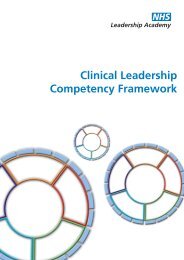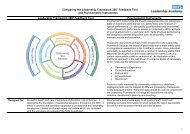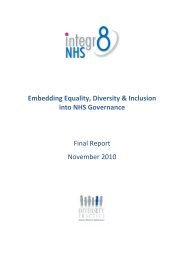Healthy NHS Board: a review of - NHS Leadership Academy
Healthy NHS Board: a review of - NHS Leadership Academy
Healthy NHS Board: a review of - NHS Leadership Academy
Create successful ePaper yourself
Turn your PDF publications into a flip-book with our unique Google optimized e-Paper software.
Population health<br />
Population health remains an important priority (The<br />
King’s Fund, 2012). As described in our original <strong>review</strong>,<br />
it is important that boards have an awareness <strong>of</strong> local<br />
needs through effective intelligence. For example,<br />
the English Department <strong>of</strong> Health’s response to the<br />
Francis report notes the importance <strong>of</strong> local Health<br />
and Wellbeing <strong>Board</strong>s in improving population health<br />
(Department <strong>of</strong> Health, 2013c). Also, as outlined<br />
elsewhere, ongoing dialogue with and engagement<br />
<strong>of</strong> the public (see ‘Ensuring accountability’ (Section<br />
3.2) and ‘Engagement’ (Section 4.3)) may encourage<br />
greater ownership <strong>of</strong> organisational priorities and<br />
services, and the public health message. This effect is<br />
potentially stronger in <strong>NHS</strong> Foundation Trusts, where<br />
the governance structure might give the public a greater<br />
sense <strong>of</strong> ownership, though research indicates some<br />
progress remains to be made in this setting (Ocloo et al.,<br />
2013, Wright et al., 2011, Allen et al., 2012b).<br />
Resource management and productivity<br />
Analyses conducted both before and after our original<br />
<strong>review</strong> note the existence <strong>of</strong> a significant ‘productivity<br />
gap’ in the <strong>NHS</strong> and the need to reduce variation and<br />
waste (Appleby et al., 2009, Appleby et al., 2010,<br />
Department <strong>of</strong> Health, 2011).<br />
Chambers et al’s recent <strong>review</strong> suggests that, despite<br />
exceptions mentioned elsewhere, there is limited<br />
empirical evidence on the relationship between board<br />
composition and organisational performance (Chambers<br />
et al., 2013).<br />
Productivity is influenced by a number <strong>of</strong> workforce<br />
issues (West et al., 2010, McKee et al., 2010, Boorman,<br />
2009, Appleby et al., 2011, Committee on Standards in<br />
Public Life, 2013). Staff turnover is identified in a <strong>review</strong><br />
on engaging boards as a major cost to organisations<br />
(West et al., 2010). Research suggests HR practices,<br />
including staffing, training, and sophistication <strong>of</strong><br />
performance appraisal, are associated with productivity<br />
(McKee et al., 2010). <strong>Board</strong>s may support improved<br />
productivity through supporting robust management,<br />
performance benchmarking, and engagement; such<br />
activities may align staff with organisational priorities<br />
and reduce absenteeism (it is noted that 70% <strong>of</strong><br />
spending in acute and mental health trusts comprises<br />
cost <strong>of</strong> staff) (Appleby et al., 2010). However, research<br />
on productivity recommends that boards be aware <strong>of</strong><br />
the need to balance a drive for productivity with the risk<br />
<strong>of</strong> staff burnout (Maben et al., 2012).<br />
22 The <strong>Healthy</strong> <strong>NHS</strong> <strong>Board</strong>, 2013: Principles for Good Governance











